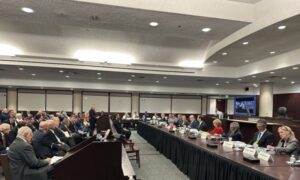Hillsborough County State Attorney Suzy Lopez addressed the Florida Supreme Court’s Judicial Circuit Assessment Committee at its final public hearing in Tampa to ask members to ensure crime victims are fully supported as the committee considers circuit consolidation.
State Attorney Lopez explained that crime victims deserve robust resources and access to information regardless of the committee’s final decision.
 The committee heard testimony from the legal community and local leaders as its members gather information prior to submitting a recommendation regarding circuit consolidation to the Supreme Court by December 1st. The committee is currently analyzing the allocation of resources and methods across the state to improve the delivery of judicial services to our communities.
The committee heard testimony from the legal community and local leaders as its members gather information prior to submitting a recommendation regarding circuit consolidation to the Supreme Court by December 1st. The committee is currently analyzing the allocation of resources and methods across the state to improve the delivery of judicial services to our communities.
The Florida Supreme Court will issue guidance to lawmakers who could ultimately vote on the issue during the next legislative session. Lawmakers introduced the proposal to learn more about whether the move would generate substantial cost savings through greater efficiencies.
“When we talk about assessing our State’s judicial circuits, we are talking fundamentally about access to courts and the far too scarce resources for crime victims,” State Attorney Lopez told the committee. “In our circuit, we place a premium not merely on counting how many cases we handle, but rather giving crime victims the dignity and support they need.”
State Attorney Lopez meets with every homicide victim’s family personally to help them navigate the legal system. The State Attorney’s Office has a talented team of Victim Advocates who guide crime victims through every facet of their case, ensuring they are heard and supported through one of the most difficult times in their lives.
Here are State Attorney Lopez’ full remarks to the Assessment Committee at the Central Florida hearing:
“I want to speak to you today on one narrow issue at the center of the criminal justice system: crime victims. It is an issue that is not driven by population studies. It cannot be measured by the number of FTEs an agency has.
I ask you- I plead with you, to find a way in the work of this committee to stand up for crime victims. As state attorney for Hillsborough County, I have cried with mothers whose sons were killed by criminals with guns. I have grieved with families who’ve lost loved ones at the hands of drunk drivers. I have consoled families whose loved ones were killed by a serial killer and all they wanted, all they asked for, is that their 6-year odyssey through the criminal justice system finally come to an end. When we talk about assessing our State’s judicial circuits we are talking fundamentally about access to courts and the scarce resources available for crime victims. Some circuits depend on federal grants to support crime victims and others have dedicated programs held together with a patchwork of state and local funding.
In our Circuit, we place a premium not merely on counting how many cases we handle, but rather giving crime victims the dignity and support they need. I meet personally with every next of kin who has lost someone to homicide. In addition, our Sherriff’s Office and the Tampa Police Department have dedicated crime victims support teams. Our county administrator and our county commission have dedicated substantial resources to support over 30 full-time employees in our victim assistance program.
You are unlikely to find any cost savings in supporting crime victims. We should spend more. Crime victim support requires personal attention. Understanding all of the variables in that person’s life. Knowing how he or she will go to work, support their family, or simply find the resources to grieve. As you consider if consolidation’s impact on the delivery of judicial services for the State of Florida, I ask you not to lose sight of the mothers, daughters, sons, and fathers who have shared their stories with me and trusted me to find justice for them.
Our judicial circuit is comprised of just one county, but we prioritize crime victims both through our dedication of personnel and funding. If your findings and recommendations lend additional support to crime victims, then all public servants should stand in support. If you find consolidation of circuits will reduce the access and support crime victims are constitutionally guaranteed, then we should not move forward.
Thank you for your work on these issues. You have been given a complicated task and a very narrow timeframe in which to complete it. Your dedication to this mission is not lost on all of us who serve the public, and I imagine a scenario where, no matter the outcome of your work, the valuable information you gather and analyze will be useful for many years to come and important far beyond the mission of your committee.”


